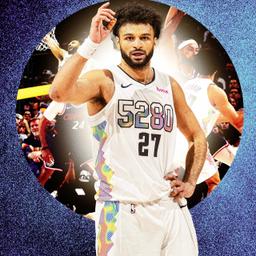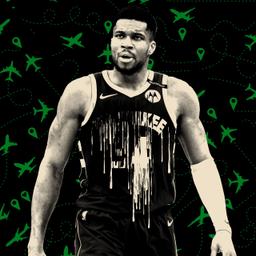They say something clicks when you enter a flow state. It’s not a fit of inspiration that you harness. It’s kind of the opposite. It’s a relinquishing of self. “You're not thinking. You're just perfectly in balance with the curvature of the Earth and the Earth spinning on its axis 1,000 miles an hour,” Lakers coach JJ Redick said earlier this season. “You've let go. You've let go, and the ball just feels weightless. And it feels like everything is going to go in.”
Whatever zone Rudy Gobert found himself in during the Timberwolves’ series-clinching 103-96 Game 5 victory over the Lakers on Wednesday night, I doubt it felt anything like a Steph Curry heater or even the flow state his teammate Anthony Edwards entered in Game 4. But in the middle of a career night, he announced his presence to the world. Gobert’s entire body tensed up as he let a primal scream pour out of him after scoring his 20th point on a tip dunk, midway through the third quarter. It felt like an unburdening of more than a decade of external doubt and ridicule that started in his teens, back when he was just a scrawny guard who couldn’t shoot but tried really hard, who hoped against hope to make it to the NBA one day—before he ever became a giant.
"He doesn't listen to the outside noise; we don't listen to the outside noise," Wolves head coach Chris Finch said after the game. "Nobody's happier for Rudy than his teammates right now, particularly Anthony, who let everybody out there on the floor know that it was Rudy's night, and nobody was around to stop him."
What does a flow state feel like for a big man routinely mocked for not being enough? Maybe it’s less about the hoop looking like the ocean, as the cliché goes, and more that the surrounding environment and everyone in it shrinks. For all the ways Gobert has become the standard-bearer for modern conservative defensive principles, it’s seemed like he's never quite experienced that feeling of heightened self-possession, the state of exacting one’s will over players much smaller than him. That is, until last night.
Gobert’s Game 5 was a bit like a revenge fantasy brought to life. A fantasy where everyone on the opposing team is at least 5 inches shorter than him and absolutely helpless to keep him from dominating the glass and rocking the rim. A fantasy where the roof has caved in from the weight of all the bricks laid out on the perimeter and Gobert is the only man capable of saving his team from the wreckage. By God, it came true. It actually happened. The Lakers’ game plan—steadfast in its commitment to small ball since they lack a playable rim runner—created the perfect storm for the greatest game of Gobert’s life. Playoff career highs of 27 points and 24 rebounds. A game that compelled Shaquille O’Neal (who called Gobert the worst player in the NBA last summer) to praise Gobert’s dominance.
It was the perfect way for the Wolves to win the series, with Gobert as the undisputed hero, prevailing over Luka Doncic, who had delivered a critical blow to Gobert’s reputation last season with one of the most iconic shots of the past half decade. Beyond Ant’s ascendance, the Wolves have proved themselves adaptive, capable of wielding (and winning with) multiple styles. Gobert's Godzillaball is worlds away from the potential death lineup that carried Minnesota through Game 4. What he did on Wednesday night can never be taken away from the big man, but it comes with the tacit knowledge that it often won’t be that way moving forward.
The Wolves now have the ability to move away from Gobert without compromising their structural integrity. Gobert has massive utility as a possession stretcher—offensive rebounds are worth their weight in gold in the postseason. But there is no catchall defense in a best of seven, and the hyper-specificity of matchups and switches can bend Gobert beyond his breaking point. In the two games before Wednesday’s series clincher, Gobert logged less than five minutes in the fourth quarters combined as the Wolves opted for a rangier unit that consistently put an undersized Lakers squad on tilt as they tried to rotate and recover on an endless procession of drives from every angle. Hopefully Gobert found the last bits of clarity he was looking for in Game 5. After all, a part of relinquishing the self is understanding one’s place in a greater dynamic. It was something he was already coming to terms with entering the game.
“This is the strength of our team. We are blessed with some really good bench players, guys that can come in and impact the game as good as anyone in this league,” Gobert told reporters after Game 3. “So it’s important for me to understand that it’s a long game.”
The Wolves await either the Golden State Warriors or the Houston Rockets—the latter of whom had a Yachty-esque epiphany on Wednesday night, remembering just how young and athletic they are compared to the Warriors. Each team presents a drastically different but equally compelling challenge. The Wolves went 1-3 against the Warriors during the regular season, but Golden State’s total margin of victory across the four games was just two points; Minnesota’s regular-season series with Houston was knotted at 2-2, but the Wolves’ total margin of victory in those four games was also just two points. The Warriors’ blend of complex screen architecture for Curry and bullyball driveways for Jimmy Butler will test the limits of the Wolves’ versatility just as much as the Rockets’ relentless and converging chaos engine would. In the first round, however, the Wolves may have discovered an ace up their sleeve that could help them against either team.
Of all the five-man lineups that have logged at least 20 minutes thus far in the postseason, the Wolves’ group of Edwards, Donte DiVincenzo, Jaden McDaniels, Julius Randle, and Naz Reid has by far the highest net rating. There is a lot to like about that particular combination of players: adequate size, playmaking on both sides of the ball, and immaculate spacing—everyone in the lineup attempted at least 3.7 3-pointers per game during the regular season, and every player averaged at least two assists per game, with a positive assist-to-turnover ratio. “I think it’s a perfect blend of passing and shotmaking and activity,” Finch said of the lineup after Game 4 on Sunday. “They really can play well off of each other. Probably that group hasn’t played a ton together, but at this point in the season, I think they’re comfortable.”
The same lineup was actually a net minus in 113 regular-season minutes, but the way it has coalesced thus far in the crucible of a best-of-seven series suggests dramatic growth among the individual players. And they adds up to a unit that embodies modern basketball logic in the way they prioritize versatility, deep spacing, and secondary actions. Minnesota has dealt with a number of significant injuries over the course of the season, but they were all, in a way, fortuitously timed and positioned. The stretch of time between February and March, when the Wolves adapted to account for both Gobert’s and Randle’s absences, looms large—Reid and McDaniels holding down the fort in the frontcourt. DiVincenzo had a rough start to the season followed by a toe sprain that sidelined him for a month, but he also closed the final 20 games of the season with supremely efficient numbers. Randle’s followed suit, returning in March from a groin strain with a greater clarity about his place on the team—he’s been the Wolves’ most consistent player in the postseason, impacting games with his physicality on drives and on defense.
Every player in the rotation has been enabled and empowered at some point in the season. Finch has cultivated a buy-in that translates to these high-pressure moments when everything gets stripped down to the essentials. “I think that unit, on the offensive end, you can throw it to anybody and anybody can get downhill and make plays for one another,” DiVincenzo said. “When that is the situation and Ant’s up top doing his thing, they have to respect everybody on the line, and he’s making the right play over and over and over again.”
Edwards, as ever, is the key to holding it all together. His brilliant postseason run was momentarily tainted in Game 5 by some questionable decisions in the second half—there is no greater siren song for the über-athletic star swingman than a mildly contested 3-pointer—but taken on the whole, Edwards has himself leveled up his processing and ability to break down a play for others. Gobert isn’t the only star on the team who’s learning in real time how to relinquish the self. Some nights yield 43-point explosions, but most won’t. Even superstars have growing pains in their climb to the mountaintop. But, now more than ever, Edwards can trust the players around him, and his teammates, in turn, can trust him to create for them. This is the deepest roster the Timberwolves have ever assembled. It’s built to pick up the slack; it’s all the Wolves have done in the second half of the season. Every player has a part to play in this postseason—even someone as star-crossed as Gobert. These Wolves, in a sense, represent the beauty of kintsugi: broken parts of a whole, held together by gold lacquer, with an allure only magnified by their apparent imperfections.



